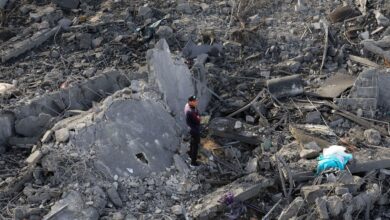
The Indonesian Hospital in the Gaza Strip lost power, becoming the first hospital in the Strip to go out of service due to running out of fuel.
The hospital announced early on Tuesday that it suffered from a power outage and the disruption of vital facilities as a result of running out of fuel, which threatens to worsen the humanitarian conditions in the Strip and indicates other hospitals are at risk.
Medical teams were forced to work with phone flashlights in order to treat the injured from the residential areas bombed in Khan Yunis by Israeli airstrikes on Monday.
The spokesperson for the World Food Program in Palestine, Alia Zaki, confirmed that aid cannot be delivered to Gaza without fuel.
The humanitarian aid that has entered Gaza so far constitutes a very small percentage compared to the size of the needs in the Strip, she stressed.
Bakeries are also threatened with closure due to fuel scarcity, she added.
According to the UN Information Center, Zaki confirmed that without fuel, hospitals or bakeries would not function, pointing out that only four bakeries affiliated with the World Food Program in Palestine are currently operating in the entire Strip – a stark fall from the 23 bakeries that operated before the Israeli air strikes started.
The World Food Program in Palestine reduced the rations that each person receives per day, in order to be able to reach the largest number of people, Zaki added.
She explained that the World Food Program focuses on delivering aid to UNRWA shelters and schools, which house hundreds of thousands of displaced people.
Zaki confirmed that they are now working on a plan to reach people outside the shelters and schools, and reiterated the importance of protecting civilians and relief workers.
The UN official pointed out that in light of the limited resources in Gaza, the lack of security on the roads, and the difficulty of movement through the Strip, the inability to deliver aid to those in need remains a pressing concern.




